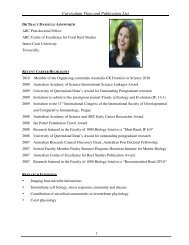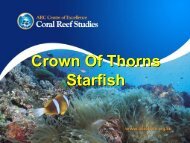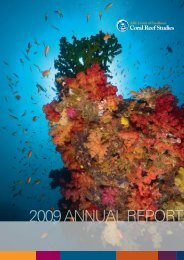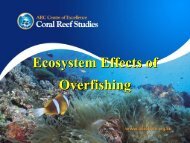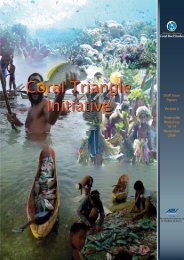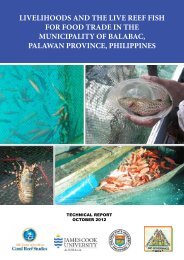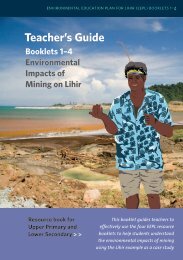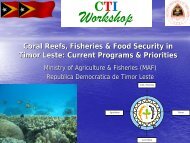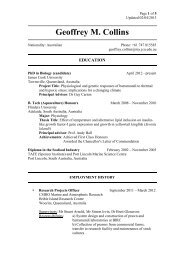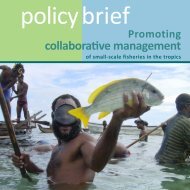Download - ARC Centre of Excellence for Coral Reef Studies
Download - ARC Centre of Excellence for Coral Reef Studies
Download - ARC Centre of Excellence for Coral Reef Studies
Create successful ePaper yourself
Turn your PDF publications into a flip-book with our unique Google optimized e-Paper software.
Media CoverageCommunicating research to diverse audiencesOnce they leave high-school, mostAustralians rely heavily on the mediaand the internet <strong>for</strong> life-long learning<strong>of</strong> science and technology. A scarythought, perhaps, but also a challengeand an opportunity <strong>for</strong> scientists to bettercommunicate their fi ndings.The <strong>ARC</strong> <strong>Centre</strong> <strong>of</strong> <strong>Excellence</strong> <strong>for</strong> <strong>Coral</strong><strong>Reef</strong> <strong>Studies</strong> was established in 2005to conduct research on the sciencethat underpins the sustainability<strong>of</strong> goods and services provided bycoral reef ecosystems. “The award<strong>of</strong> an <strong>ARC</strong> <strong>Centre</strong> <strong>of</strong> <strong>Excellence</strong>allowed us to develop a robust mediastrategy, which has increased ouroutreach enormously,” <strong>Centre</strong> DirectorPr<strong>of</strong>essor Terry Hughes says.“The smartest thing we did was investat the outset in the services <strong>of</strong> apr<strong>of</strong>essional media consultant. He worksclosely with us to craft <strong>for</strong>tnightly pressreleases, converting our sometimes nerdyscience into everyday language andpropagating them to a huge audience.These releases generated 736 mediastories – two a day – in 2006.”“Our new website has developed rapidlyduring our fi rst full year operation, andis running now at well over a millionhits per annum, with 85% coming fromoverseas. About a quarter <strong>of</strong> the hitsare generated by the <strong>for</strong>tnightly pressreleases that highlight our researchfi ndings.”“<strong>Coral</strong> reef researchers do have a naturaladvantage, because our work is topicaland <strong>of</strong>ten visually stunning. In the pastthough, we usually only responded moreor-lesspassively to media enquiries.Now, we have deliberately set out toharness the media by creating our ownnews stories, to build public awareness<strong>of</strong> their investment in coral reef science”,says Pr<strong>of</strong>essor Hughes.One recent example from February 2007was a press release entitled “Fish:Healthcare workers <strong>of</strong> the <strong>Reef</strong>”. It wasbased on a large-scale fi eld experimentwhich showed that a healthy fi shpopulation is essential <strong>for</strong> coral recoveryafter a severe bleaching event, stormor disease outbreak. “We followed therecovery <strong>of</strong> corals that had been severelydamaged by bleaching due to globalwarming. The corals were on a reefwhere fi sh populations were unusuallyintact due to the Great Barrier <strong>Reef</strong>Marine Park Authority’s no-take policy.We fenced the fi sh out <strong>of</strong> some areas,and compared coral recovery with andwithout lots <strong>of</strong> fi sh.”“The result was dramatic. The coralcover virtually doubled where the fi shhad access, while the fenced-<strong>of</strong>f areasbecame overgrown with seaweedand the corals failed to recover.”The research team concluded thathaving intact fi sh populations will bevital to successfully managing theresilience <strong>of</strong> tropical coral reefs fromthe impacts <strong>of</strong> climate change andhuman activity. “We can’t prevent futurebleaching except through internationalaction on greenhouse gas emissions,”said co-author Pr<strong>of</strong>essor Ove Hoegh-Guldberg, and Deputy Director <strong>of</strong> the<strong>ARC</strong> <strong>Centre</strong>. “In the meantime, it’simportant to do whatever we canto minimize the damage and assistreefs through these diffi cult times.”This research was reported on ABC, inNew Scientist, on the Discovery Channel,Taiwan News, the New York Sun, theSan Francisco Chronical, the WashingtonPost, and over 40 other outlets.Fellow author and Research andMonitoring Manager with the GreatBarrier <strong>Reef</strong> Marine Park Authority, DrLaurence McCook, said the researchprovided valuable in<strong>for</strong>mation <strong>for</strong> theprotection <strong>of</strong> the Great Barrier <strong>Reef</strong>.“Publicising research fi ndings likethis helps the public to appreciatethe measures needed to protect coralreefs, and to understand why it issometimes necessary to close areas<strong>of</strong> reef to fi shing. This builds publicsupport <strong>for</strong> best-practice managementand <strong>for</strong> the science that underpinsit”, says Pr<strong>of</strong>essor Hughes.Sustainability <strong>of</strong> coral reef resourcesis vital <strong>for</strong> economies and societies intropical maritime countries worldwide. InAustralia alone the Great Barrier <strong>Reef</strong> isvalued at over $5 billion a year, employs68,000 people and is a celebratedcultural icon. The <strong>ARC</strong> <strong>Centre</strong> currentlyprovides support and supervision to 114research students from 29 countries,making it a global leader in the provision<strong>of</strong> graduate training in coral reef studies.Led by James Cook University, the<strong>ARC</strong> <strong>Centre</strong> <strong>of</strong> <strong>Excellence</strong> <strong>for</strong> <strong>Coral</strong><strong>Reef</strong> <strong>Studies</strong> is a partnership withthe University <strong>of</strong> Queensland, TheAustralian National University,The Australian Institute <strong>of</strong> MarineScience, CSIRO, and the Great Barrier<strong>Reef</strong> Marine Park Authority.38



